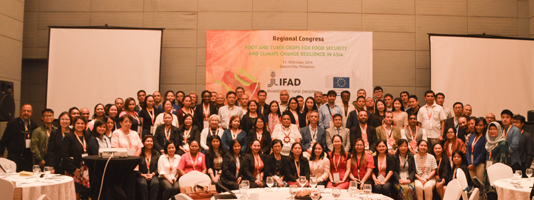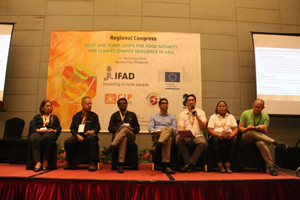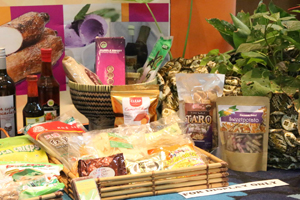
QUEZON CITY, Metro Manila – Over 100 participants from 11 countries including representatives from the government agencies, research institutions, academe, farmer’s cooperatives, private sector, and media gathered recently for the Regional Congress on Root and Tuber Crops.
 Co-organized by the International Potato Center (CIP) and the Department of Science and Technology-Philippine Council for Agriculture, Aquatic and Natural Resources Research and Development (DOST-PCAARRD), the two-day event provided a venue to discuss and promote cross learning of advanced root and tuber crop technologies, policy measures, and pragmatic approaches for exploiting opportunities and challenges amidst climate change.
Co-organized by the International Potato Center (CIP) and the Department of Science and Technology-Philippine Council for Agriculture, Aquatic and Natural Resources Research and Development (DOST-PCAARRD), the two-day event provided a venue to discuss and promote cross learning of advanced root and tuber crop technologies, policy measures, and pragmatic approaches for exploiting opportunities and challenges amidst climate change.
With the theme, "Root and Tuber Crops for Food Security and Climate Change Resilience in Asia," the participants discussed opportunities and constraints for roots and tubers in Asia, especially in the face of climate change-associated risks and challenges. Furthermore, the Congress aimed to present an opportunity to promote technological, commercial and institutional innovations across value chain actors; share key findings of the recently concluded FoodSTART+ project led by CIP; provide a forum for public-private sector discussions for future collaborations; and enhance awareness of and visibility of European Commission's contribution to national and regional agricultural programs.
 The Congress consisted of four parts: plenary sessions on breeding, agronomy, pest management, and contribution of roots and tubers to the resilience of agri-food systems; Knowledge Learning Fair (KLF) showcasing innovations in seed systems, postharvest practices and product development from selected organizations; roundtable discussions; and field visits in Pampanga to present successful experiences on cultivation, processing and contractual arrangements for sweetpotato and cassava.
The Congress consisted of four parts: plenary sessions on breeding, agronomy, pest management, and contribution of roots and tubers to the resilience of agri-food systems; Knowledge Learning Fair (KLF) showcasing innovations in seed systems, postharvest practices and product development from selected organizations; roundtable discussions; and field visits in Pampanga to present successful experiences on cultivation, processing and contractual arrangements for sweetpotato and cassava.
The activity was made possible through the partnership with the Philippine Root Crop Research and Training Center, Visayas State University (VSU-PhilRootcrops), and financial support from the International Fund for Agricultural Development (IFAD) and the European Union (EU).
